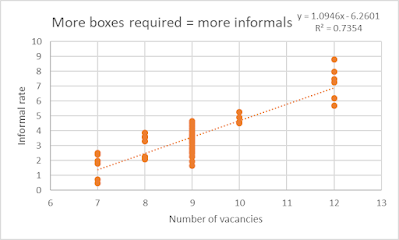Some quick comments, which will be updated with comments on the debate (if any) surrounding the Local Government (Elections) Amendment Bill 2022, which is on the notice paper for introduction into the House of Assembly very soon.
Council elections are due to be held in October this year. This Bill would make the following changes:
(i) making voting compulsory
(ii) reducing the number of boxes a voter must number correctly for a valid vote from up to 12 (varying by council) to 5 (votes with errors in numbers beyond 5 will be formal under savings provisions.)
Of these, (ii) is a critical and necessary change to the voting system, whether or not (i) is passed. If (i) were to be passed in the absence of (ii), it is likely (ii) would become even worse. I've always been ambivalent at best about compulsory voting in council elections but I would greatly prefer to see this Bill as it is passed than to not see (ii) passed; I also think the case for compulsory voting is better now than it has been in the past.
Formality reforms are necessary and urgent
The 2014 and 2018 council elections saw unacceptably high rates of unintentional informal voting in the cities. Many voters trying to vote from 1 to 12 on ballot papers with dozens of candidates and no party cues made mistakes and their votes were not counted. This problem was a by-product of the shift from half-in half-out to all-in all-out elections prior to the 2014 ballots. Contests where a voter previously had to number from 1 to 6 without error now required voters to number from 1 to 12 without error, with zero tolerance for mistakes.
Overall informal voting increased from 2.43% in 2011 (half-in half-out) to 4.49% in 2014 and 5.13% in 2018, with the shift from 2011 to 2014 being entirely explained (and then some) by a rise in unintended informal voting. Comparing the 2011 and 2014 TEC informal vote surveys, ballot papers deemed informal because of omitted numbers rose from 1425 to 2605 (an 83% increase) and ballot papers deemed informal because of repeated numbers rose from 843 to 4090 (a 385% increase). In 2018 there was a further increase with omitted number informals up to 3256 and repeated number informals up to 4942.
Through-the-roof informal rates in 2018 included 8.78% in Hobart, 7.94% in Launceston and 7.28% in Clarence. I previously posted a number of graphs on this problem; this I think is the most important one (data from 2014 and 2018 combined):
In a state where local government seats are frequently decided by a few dozen votes or less (a recent Hobart recount was decided by less than two votes), there is little doubt that the current system is sometimes electing the wrong councillors and is not democratically legitimate. A voting system must accept that some voters do not have strong clerical or numeracy skills and that excluding such voters through absurdly strict counting rules is likely to result in seats being wrongly decided (whether because voters for some candidates will be more prone to vote informally, or just by chance.)
Reducing the number of boxes required from the number of vacancies to 5 will increase the currently negligible exhaust rate, though plenty of voters will still number beyond 5 and experience of the somewhat similar Senate system suggests exhaust rates won't be massive (I suspect they will rise from below 1% to a few percent). However, a vote exhausting because a voter chooses not to number further boxes is a minor matter compared to a vote being not counted at all because the voter made a mistake with their tenth or eleventh preference at a point at which their vote may well have had no impact anyway. As with Senate reform in 2018, an increased exhaust rate is an unavoidable price to pay if excessive and undemocratic unintentional informal voting rates are to be avoided.
I should note that the format of the ballot instructions in Tasmania for these elections is designed to reduce exhaust. At the top of the ballot paper voters are told to "Number the boxes from 1 to N in order of your choice" (where N is the number of vacancies). At the bottom is a message which would change to "Number at least 5 boxes to make your vote count."
Compulsory voting
In the past I've opposed introducing compulsory voting for local government. I generally think that any measures (however slight) that affect the liberty of citizens need to have a good argument for them, and that the case has generally not been made out in the past. In particular, participation rates in Tasmanian council voting have long been excellent, so there has been a strong "it aint broke don't fix it" argument. It's not clear that compulsory voting will mean better representation - it might benefit candidates who were good at getting votes from people apathetic about local government (celebrities, incumbents or party candidates) but who might not be particularly good councillors.
However, I think there's a better case now for taking that risk. In the last few years the impact of council politics on many young voters has greatly increased, primarily because of the ongoing issues with affordable housing and rental availability. Councils have a large impact on the housing market and on the regulation of short-stay accommodation. Although there was improvement in 2018, young voters are still severely under-represented in voluntary voting in councils, as shown in the TEC's report on the 2018 election:


Force a few amalgamations first then work out how we vote or preferably do it at the same time.
ReplyDeleteCouncillors scream about amalgamation so how about the state government ask the people what they think?
Comment from John Pyke:
ReplyDelete"As to the formality rules at least, a very sensible reform. Now for something similar for the House of Reps (though requiring 1-6 would make sense, for uniformity with the Senate)."